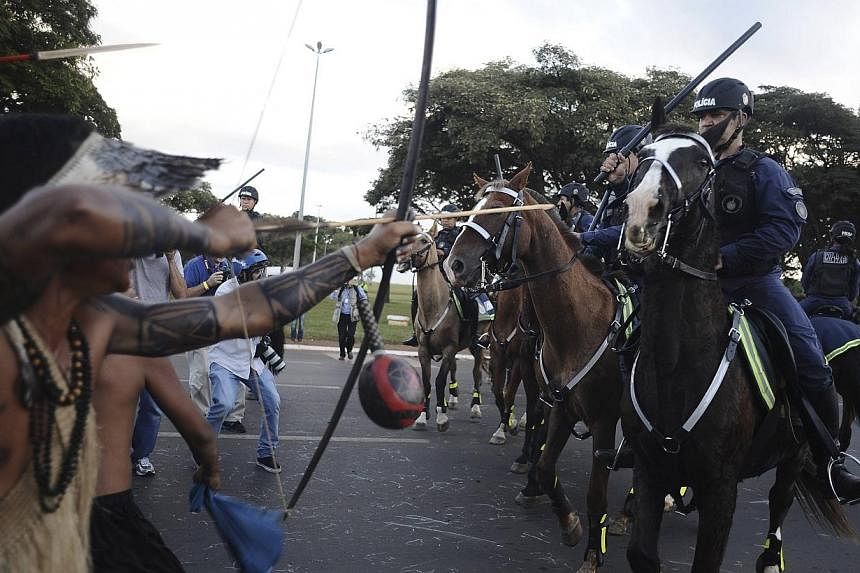While football fans around the world are eagerly counting down to the World Cup on June 12, at least tens of thousands of people in Brazil are saying 'no' to the tournament.
They've been rallying against the World Cup, saying the cost of hosting the world's biggest soccer event is too excessive for a developing nation.
Various groups - from indigenous people, bus drivers, teachers and even police officers - are riding on this anti-World Cup sentiments to voice their unhappiness over different issues.
Here's a quick look at some of their grouses:
Cost of hosting World Cup
The World Cup will cost Brazilian taxpayers US$11 billion (S$13.8 billion). The construction of 12 new or refurbished stadiums alone costs about 8 billion reais (S$4.5 billion), 2.7 billion reais more than the first detailed estimate in 2010 and almost four times the amount estimated in 2007.
The most costly stadium is Estadio Nacional Mane Garrincha in Brasilia, which came with a US$900-million price tag.
The Granja Comary training complex, used by Brazil's national squad, was given a multi-million-dollar facelift. Facilities include 39 individual rooms with king-size beds and several full-size pitches where Luis Felipe Scolari will prepare his team before they play the opening match against Croatia in Sao Paulo.
Demarcation of ancestral lands

Full-blooded indigenous people in Brazil - who make up 0.3 per cent of the population of 200 million - have staged a series of protests in recent months, accusing President Dilma Rousseff's government of stalling the demarcation of their ancestral lands and pursuing policies that favour large-scale farming.
In a protest at Brasilia's government square on Tuesday, bow-and-arrow wielding indigenous chiefs joined forces with anti-World Cup demonstrators to condemn the money spent on the tournament. One police officer was shot in the leg by an arrow during a scuffle.
"Before organising the World Cup, Brazil should have thought more about health, education and housing," said Neguinho Truka, a leader of the Truka people in the northern state of Pernambuco.
Salaries

Several groups including bus drivers, teachers and police officers are demanding higher salaries to cope with inflation. Walkouts by bus drivers in recent months have caused crippling traffic chaos in cities. Traffic jams reached a 2014 record of 261km in Sao Paulo on May 21 as 15,000 buses blocked roads after their drivers threw away their keys as a form of protest. The drivers are demanding more than a 10 per cent pay increase in salaries.
Teachers are also demanding more pay. "An educator is worth more than Neymar", a group of teachers chanted at a recent protest, referring to Brazil's star striker Neymar da Silva Santos Júnior.
Civil police forces in 17 states including Sao Paulo suspended most activities on May 22, such as reporting on thefts and traffic violations. A week earlier, there was a similar walkout by military police in the north-eastern city of Recife, which will host World Cup games. The government was forced to deploy the national guard and army troops amid reports of looting.
Lax laws
Besides demanding higher salaries, police in Brazil are also seeking stricter laws that would make it easier to prosecute suspects, said Mr Rodrigo Franco, head of Brasilia's Civil Police Union. "We're tired of seeing criminals walk free three or four days after we arrest them."
Poverty, housing

The Homeless Workers Movement has been calling for affordable housing for the ordinary people. It says the money spent on building stadiums could have been spent fighting poverty, but instead has served to rapidly increase rental prices.
"We are here to protest against the Cup, against the huge spending on the World Cup while we do not have housing or healthcare or anything else," said Luiz Giovani, a member of the movement.
Source: Reuters, AFP, Bloomberg

